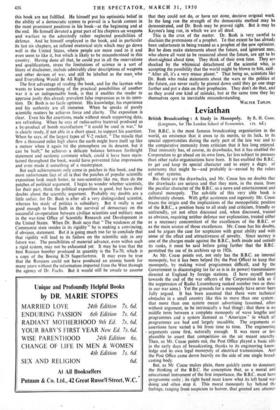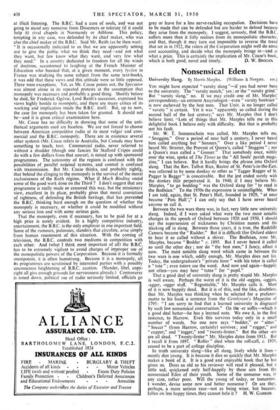Leviathan
British Broadcasting : A Study in Monopoly. By R. H. Coase.
(Longmans, for The London School of Economics. r 25. 6d.)
THE B.B.C. is the most famous broadcasting organisation in the world, an eminence that it owes to its merits, to its luck, to its special opportunities during the early part of the late war and to the comparative immunity from criticism that it has long enjoyed. That immunity has, of course, its drawbacks, but it has enabled the Corporation to go ahead on its own lines, far less subject to pressure than other radio organisations have been. It has enabled the B.B.C. to get and keep its special character and to enjoy a degre of autonomy that might be—and probably is—envied by the rulers of other systems.
But there are the drawbacks, and Mr. Coase has no doubts that the drawbacks are serious and that they stem, in the main, from the peculiar character of the B.B.C. as a news and entertainment and cultural monopoly. The sub-title of this very able book is deliberately chosen. With great acuteness and ingenuity Mr. Coase traces the origin and the implications of the monopolistic position of the B.B.C., a position basic to all study and criticism, friendly or unfriendly, yet not often discussed and, when discussed,, treated as obvious, requiring neither defence nor explanation, treated either as a necessary concomitant of the excellences of the B.B.C. or as the main source of those excellences. Mr. Coase has his doubts, and he argues the case for scepticism with great ability and with some of the effect and attractiveness of novelty. Since secrecy is one of the charges made against the B.B.C., both inside and outside its ranks, it must be said before going farther that the B.B.C. permitted the use of its archives up to 1926.
As Mr. Coase points out, not only has the B.B.C. an internal monopoly, but it has been helped (by the Post Office) to keep that monopoly, by making wired programmes difficult, and by the Government in discouraging (as far as is in its power) transmissions directed at England by foreign stations. (I have myself heard towards the end of the war officers of the Corporation talk as if the suppression of Radio Luxembourg ranked number two or three in our war-aims.) Yet the grounds for a monopoly have never been fully argued. It has been assumed that there were technical obstacles in a small country like this to more than one system ; that more than one system meant advertising (assumed, often without argument, to be intrinsically a bad thing) ; that there is no middle term between a corn, plete monopoly of wave lengths and programmes and a system damned as " American " in which all programmes are bad and largely inaudible. The arguments or assertions have varied a bit from time to time. The engineering arguments came first, naturally enough. It was more or less plausible to assert that competition on the air meant anarchy. Then, as Mr. Coase points out, the Post Office played a basic role in the early days of broadcasting, thanks to its engineering know- ledge and its own legal monopoly of electrical transmission. And the Post Office came down heavily on the side of one single broad- casting body.
But, as Mr. Coase makes plain, there quickly came to dominate the thinking of the B.B.C. the conception that, as a moral and educational instrument of the first importance, the B.B.C. must have programme unity ; its right hand must know what its left hand was doing and often stop it. This moral monopoly lay behind the feelings, ranging from suspicion to horror, that greeted any attempt
at illicit listening. The B.B.C. had a cure of souls, and was not going to stand any nonsense from Dissenters or tolerate (if it could help it) rival chapels in Normandy or Athlone. This policy, tempting in any case, was defended by its chief maker, who was also the chief maker of the B.B.C. Said Mr. Reith (as he then was): " It is occasionally indicated to us that we are apparently setting out to give the public what we think they need—and not what they want, but few know what they want, and very few what they need." In a country dedicated to freedom for all the winds of doctrine, accustomed to laughing at the French Minister of Education who boasted that, at a given moment, every lyceen in France was studying the same subject from the same text-books, it was odd that these views and this attitude were so little opposed. There were exceptions. Yet, as Mr. Coase points out, the Spectator was almost alone in its repeated protests at the assumption that monopoly was necessary and probably a good thing. Shortly before he died, Sir Frederick Ogilvie, Lord Reith's successor, expressed his views highly hostile to monopoly, and there are many critics of its working and implication inside the B.B.C. itself. But, up to now, the case for monopoly has been taken for granted. It should not be—and it is given critical examination here.
Mr. Coase has no difficulty in showing that some of the anti- thetical arguments used are baseless. We are not forced to choose between American competitive radio at its most vulgar and com- mercial and the B.B.C. monopoly. There are in existence several other systernt (Mr. Coase refers to Australia, but Canada may have something to teach, too). Commercial radio, never referred to without a shudder (though one fancies Sir Stafford Cripps could do with a few dollars from that source), is mixed up with sponsored programmes. The autonomy of the regions is confused with the possibilities of parallel national systems, and control is confused with transmission. But Mr. Coase thinks, and probably rightlg, that behind the clinging to the monopoly is the survival of the moral exclusiveness of the Reith regime. What if Much Binding undid some of the good work done on the Third ? I don't suggest that any programme is really made or censored this way, but the missionary view, excellent in its place, probably gives that moral conviction of rightness, of defending the British heritage, that has prevented the B.B.C. thinking hard enough on the question of whether the monopoly is necessary, or whether it could be modified without any serious loss and with some serious gain.
That the monopoly, even if necessary, has to be paid for at a high price is surely evident. In a highly competitive industry, entertainment, the B.B.C. is the only employer in one important field. Some of the rumours, jealousies, slanders that circulate, arise simply from human resentment of this situation. With the coming of television, the B.B.C. controls two mediums in competition with each other. And (what I think most important of all) the B.B.C. has to be extremely vigilant to avoid charges of improper use of the monopolistic powers of the Corporation. Because it is formally omnipotent, it is often hamstrung. Because it is a monopoly, all its programmes are scrutinised by interested parties with a possibly unconscious heightening of B.B.C. caution. (Slander, libel, copy- right all give enough grounds for nervousness already.) Controversy is toned down, political use of radio seriously limited, officials go grey or leave for a less nerve-racking occupation. Decisions have to be made that can be defended but are harder to defend because they arise from the monopoly. I suggest, serously, that the B.B.C. suffers more than it fully realises from its monopolistic character, and that, though it may turn out impossible to reverse the trend that set in in 1922, the rulers of the Corporation might well do some cost accounting, and decide what the monopoly brings in—and at what a price. This is certainly the implication of Mr. Coase's book,
which is both good, novel and timely. D. W. BROGAN.







































 Previous page
Previous page